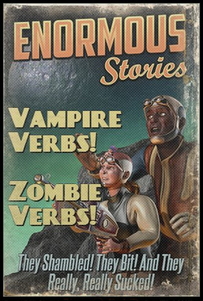
In case you missed it, Here’s where to find Part 1: The Most-Hated Writing Advice Ever.
This installment focuses on verbs, good, bad, and ugly. You remember fourth grade, right? That was probably around the first time you heard a teacher say “Verbs are action words.” But not all verbs are created equal in the action department, and in this self-editing article I’ll be explaining why. Along the way you may learn why certain passages in your prose don’t move quite the way you hoped they would.
This installment focuses on verbs, good, bad, and ugly. You remember fourth grade, right? That was probably around the first time you heard a teacher say “Verbs are action words.” But not all verbs are created equal in the action department, and in this self-editing article I’ll be explaining why. Along the way you may learn why certain passages in your prose don’t move quite the way you hoped they would.
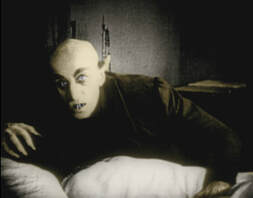 Try not to suck
Try not to suck The Vampire Verb: To Be
“To be”—usually encountered in writing as “was” and “were”*—is the weakest verb in the language, the most common, and the most unnecessary in narrative.
Additionally, for nearly any sentence you can compose in English, “There was” is going to be the weakest possible beginning. For instance:
Weak: “There were two tigers standing near the road.”
Strong: “Two tigers stood near the road.”
Weak: “There was a limousine at the curb.”
Strong:“A limousine idled at the curb.”
In both cases, the first example is flabby by comparison to the second. The top sentence reports something that can be seen, but that’s all it does. It contains neither action nor tension. The second sentence in both examples invites the reader’s mind to ask “...and then what?”
“To be” in descriptions should ring your “show, don’t tell” alarms. “Melissa was a respected mathematician” or “Taylor was tall” cry out for an editorial rap on the knuckles.
Used as an auxiliary with even the strongest verb, “was” is a vampire that sucks all the life out of its attendant action verb. “Was screaming” for “screamed,” “were fighting” for “fought,” “was running” for “ran,” etc.—in every case it’s weaker than the action verb on its own. In word superhero terms, “to be” is verbal kryptonite.
*If you’re writing in the present tense, “is” and “are” are your culprits.
“To be”—usually encountered in writing as “was” and “were”*—is the weakest verb in the language, the most common, and the most unnecessary in narrative.
Additionally, for nearly any sentence you can compose in English, “There was” is going to be the weakest possible beginning. For instance:
Weak: “There were two tigers standing near the road.”
Strong: “Two tigers stood near the road.”
Weak: “There was a limousine at the curb.”
Strong:“A limousine idled at the curb.”
In both cases, the first example is flabby by comparison to the second. The top sentence reports something that can be seen, but that’s all it does. It contains neither action nor tension. The second sentence in both examples invites the reader’s mind to ask “...and then what?”
“To be” in descriptions should ring your “show, don’t tell” alarms. “Melissa was a respected mathematician” or “Taylor was tall” cry out for an editorial rap on the knuckles.
Used as an auxiliary with even the strongest verb, “was” is a vampire that sucks all the life out of its attendant action verb. “Was screaming” for “screamed,” “were fighting” for “fought,” “was running” for “ran,” etc.—in every case it’s weaker than the action verb on its own. In word superhero terms, “to be” is verbal kryptonite.
*If you’re writing in the present tense, “is” and “are” are your culprits.
 Michonne kicks ass. Zombie verbs don't.
Michonne kicks ass. Zombie verbs don't. The Zombie Verb: To Have
“Had” is perhaps not quite as weak as “was,” but it’s in the ballpark. It shambles where it ought to shine. It drags your writing down to the ground and rips a bite out of its...okay. I’ll stop.
As a writer painting a verbal picture for your readers, you want to tell them not just what someone or something “had,” but also give them an idea of what that means to the story, its action, and its characters.
Weak: “Stella had a new hat.”
Strong: “Stella wore her new hat raked low over one eye.”
Weak: “The church had a door that dated back to the 14th century.”
Strong: “The church door, dating back to the 14th century, showed its age in weather-bleached wood and pitted iron bindings.”
There’s almost never anything you can say with a verb like “had” that you couldn’t say more effectively with some creative rephrasing.
Note: “Had” is also used as an auxiliary verb necessary to establish past perfect tense, which is used in flashbacks or anytime you want to establish that a thing happened in the past and is being recalled in the present. In these cases it’s not a problem word.
"Harry knew now where he had seen her before: she was Carpenter’s ex-girlfriend."
"She had not been an athletic child, nor a graceful one, but had stumbled through those years with perpetually scraped elbows and skinned knees."
“Had” is perhaps not quite as weak as “was,” but it’s in the ballpark. It shambles where it ought to shine. It drags your writing down to the ground and rips a bite out of its...okay. I’ll stop.
As a writer painting a verbal picture for your readers, you want to tell them not just what someone or something “had,” but also give them an idea of what that means to the story, its action, and its characters.
Weak: “Stella had a new hat.”
Strong: “Stella wore her new hat raked low over one eye.”
Weak: “The church had a door that dated back to the 14th century.”
Strong: “The church door, dating back to the 14th century, showed its age in weather-bleached wood and pitted iron bindings.”
There’s almost never anything you can say with a verb like “had” that you couldn’t say more effectively with some creative rephrasing.
Note: “Had” is also used as an auxiliary verb necessary to establish past perfect tense, which is used in flashbacks or anytime you want to establish that a thing happened in the past and is being recalled in the present. In these cases it’s not a problem word.
"Harry knew now where he had seen her before: she was Carpenter’s ex-girlfriend."
"She had not been an athletic child, nor a graceful one, but had stumbled through those years with perpetually scraped elbows and skinned knees."
 The panda kicks all the ass
The panda kicks all the ass Verbs That Kick Ass
Action verbs, like action heroes, kick all the ass.
Stories move best when writers not only use verbs that describe action, but strong, specific verbs that paint a moving picture in the reader’s mind—the more specific the verb, the clearer the picture. A character doesn’t just move down the street--he walks, stalks, strides, paces, prances, trots, meanders, skips, skulks, runs, dashes, sprints, or gallops. Each of these verbs paints a completely different picture for your reader.
Verbs should also—as often as possible—be unencumbered by adverbs, about which more next time in Attack of the Adverbs!
Use your verbs. Kick the ass.
Action verbs, like action heroes, kick all the ass.
Stories move best when writers not only use verbs that describe action, but strong, specific verbs that paint a moving picture in the reader’s mind—the more specific the verb, the clearer the picture. A character doesn’t just move down the street--he walks, stalks, strides, paces, prances, trots, meanders, skips, skulks, runs, dashes, sprints, or gallops. Each of these verbs paints a completely different picture for your reader.
Verbs should also—as often as possible—be unencumbered by adverbs, about which more next time in Attack of the Adverbs!
Use your verbs. Kick the ass.
TL;DR
The verbs "to be" and "to have" tend to weaken your prose. The more you can replace them with specific action verbs that convey your intention to the reader, the more you’ll improve your writing.
How many times did you use “was ____ing?” instead of a stronger verb?
Have you used “had” instead of stronger verbs that convey more meaning?
You might also be interested in reading:
Self-Editing for Everyone Part 3: Attack of the Adverbs!
(This article originally appeared on BridgetMcKenna.com.)
COVER ART
All the fabulous pulp magazine covers on this article series were created using the amazing Pulp-O-Mizer from art by its creator, Bradley W. Schenck.
The verbs "to be" and "to have" tend to weaken your prose. The more you can replace them with specific action verbs that convey your intention to the reader, the more you’ll improve your writing.
How many times did you use “was ____ing?” instead of a stronger verb?
- Replace “was” with stronger verbs that convey more meaning.
- Replace “was ____ing” phrasing with stronger verb forms.
Have you used “had” instead of stronger verbs that convey more meaning?
- Replace "had" wherever possible with a stronger verb, except when establishing flashbacks.
You might also be interested in reading:
Self-Editing for Everyone Part 3: Attack of the Adverbs!
(This article originally appeared on BridgetMcKenna.com.)
COVER ART
All the fabulous pulp magazine covers on this article series were created using the amazing Pulp-O-Mizer from art by its creator, Bradley W. Schenck.

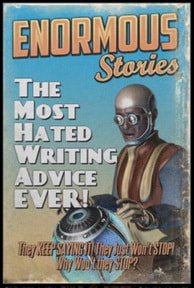
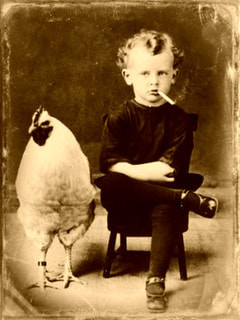
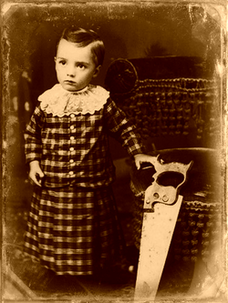
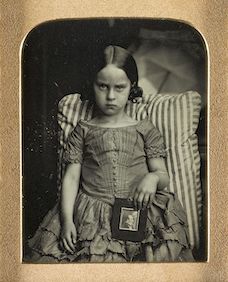
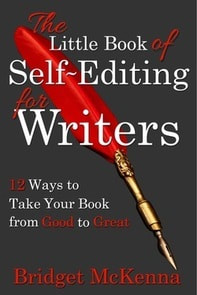
 RSS Feed
RSS Feed
